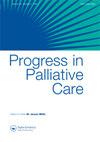A comparison of symptom management and utilization of specialist palliative care in the early COVID-19 pandemic: A multi-site retrospective chart review
IF 0.8
Q4 PUBLIC, ENVIRONMENTAL & OCCUPATIONAL HEALTH
引用次数: 0
Abstract
Background: COVID-19 is associated with high rates of morbidity and mortality. Previous work has described symptom management provided by specialists in palliative care for COVID-19 patients. However, there is a paucity of literature describing primary level palliative care provided by general internal medicine teams or reasons for referral to specialists. Objective: Our aim was to describe and compare the following outcomes for patients dying of COVID-19: (1) symptom management by acute care providers and palliative care specialists, and (2) utilization of palliative care consultation across two acute care hospitals in Toronto, Ontario during the onset of the COVID-19 pandemic. Methods: We undertook a retrospective chart review of 45 adult inpatients diagnosed with COVID-19 between 23 January 2020 to 19 May 2020 who died, and/or those who had a palliative care consultation. Findings: Forty-one of the 45 patients died. Common symptoms were shortness of breath and agitation. For these symptoms, pharmacologic management was not significantly different for patients seen by palliative care compared to those without consultation. Most consultations were for end-of-life care. There were significantly more palliative care consults for COVID-19 patients at one hospital (P=.001). Conclusion: The findings highlight the significant discrepancy in involvement of specialist palliative care between settings. More research is needed to validate the initial findings from this small sample size, understand the needs of palliative care providers in this setting, and appreciate the factors influencing consultation.COVID-19大流行早期症状管理和专科姑息治疗应用的比较:一项多地点回顾性图表综述
本文章由计算机程序翻译,如有差异,请以英文原文为准。
求助全文
约1分钟内获得全文
求助全文
来源期刊

PROGRESS IN PALLIATIVE CARE
PUBLIC, ENVIRONMENTAL & OCCUPATIONAL HEALTH-
CiteScore
2.60
自引率
11.80%
发文量
24
期刊介绍:
Progress in Palliative Care is a peer reviewed, multidisciplinary journal with an international perspective. It provides a central point of reference for all members of the palliative care community: medical consultants, nurses, hospital support teams, home care teams, hospice directors and administrators, pain centre staff, social workers, chaplains, counsellors, information staff, paramedical staff and self-help groups. The emphasis of the journal is on the rapid exchange of information amongst those working in palliative care. Progress in Palliative Care embraces all aspects of the management of the problems of end-stage disease.
 求助内容:
求助内容: 应助结果提醒方式:
应助结果提醒方式:


